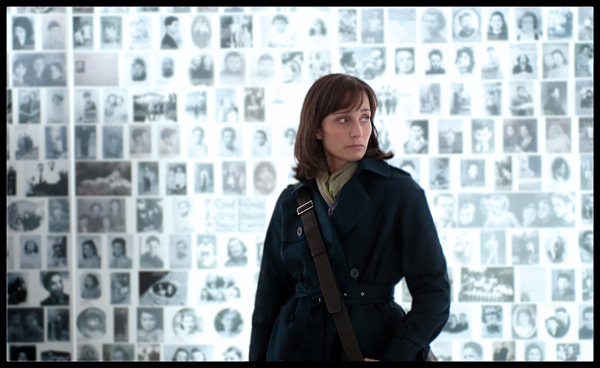|
Reviews of Recent Independent, Foreign, & Documentary Films in Theaters and DVD/Home Video

SARAH’S
KEY In 1995, French President Jacques Chirac officially acknowledged that the government had efficiently carried out Nazi directives to hand over the Jewish population. Since then there has been a spurt of soul-searching literature and films to shake the country’s popular image of itself as broadly supporting the Resistance under the Occupation. Chirac apologized for the active role of the police in the one-by-one arrests of Jewish refugees from the east and then of French Jewish men (including director Gilles Paquet-Brenner’s grandfather). He focused on a very visible tragedy in July 1942 in Paris, when Jewish women, children, and the elderly were marched through the streets, put on buses and trolleys, forced into the enclosed Vélodrome d'Hiver sports stadium, then sent on French trains into transit camps and on to the death camps. All of Paris watched the round-up happen, and all of Paris did not speak of it again for decades, even when very few Jews returned after the war. Tatiana de Rosnay’s best-selling novel Sarah’s Key found an emotionally effective way to link two of the most powerful elements of these facts—the cruel innocence of small children caught in the maw and the country’s subsequent amnesia—through the occupants of one apartment in Paris, then and now. On July 16, 1942, 10-year-old Sarah Starzynski (Mélusine Mayance) is playing hide-and-seek with her little brother Michel. When there’s a frightening knock on the door from the gendarmes, she quickly leads him into a secret closet. She promises to come right back, but after she locks the closet with a key, she and her mother are thrown out into the street, and a neighbor reveals her haggard father’s hiding place (the building’s cellar). In 2009, American journalist Julia Jarmond (Kristin Scott Thomas, smoothly using her bilingual skills) walks through the same apartment as her architect husband enthusiastically guides her and their teenage daughter through the home that his family has lived in for more than 60 years. He also shows off his plans for renovation. When Julia’s English-language magazine assigns her to cover an anniversary of Chirac’s declaration, she starts asking her husband’s beloved grandmother questions, and Julia’s startled to realize that the family moved into the empty apartment right after the round-up. Was there a connection and did her in-laws know it? Is that why her father-in-law is so upset about her research? The film then flashes back to the summer of 1942, where Sarah’s family is pushed into the stadium, with no food or working sanitary facilities. (Julia lectures her ignorant young colleagues to understand their conditions by comparing it to the Louisiana Superdome after Hurricane Katrina as “a million times worse.”) On the site today, the only evidence she finds of what happened there are memorial plaques put up after Chirac’s speech (like ones put up by the director’s mother-in-law). Archives turned over from French government records lead Julia to the Starzynski family as the previous occupants of her in-laws’ apartment. She also learns of Sarah’s transfer to the Beaune-la-Rolande transit camp, where the fear and chaos of families torn apart is captured close-up from Sarah’s point of view by director of photography Pascal Ridao’s hand-held camera, though it’s almost overwhelmed by the swelling score. Through the terror, Sarah agonizes about her brother and desperately hangs on to the key, scheming to escape and to get back to him in Paris. Her fate, and that of her brother’s, remains a mystery Julia is determined to solve. The script, co-written by the director, cuts only some of the soap opera-esque elements in the novel of Julia’s troubled marriage (the stiffest parts of the film) to focus on her obsession to track down Sarah and her family—to rural France, to New York, to Italy. Wherever Julia follows clues, she finds denial and disbelief. Until Chirac’s apology, the French were eager to blame the round-ups and their ramifications all on the Gestapo, targeting Klaus Barbie in his late 1980s trial, as seen in the Marcel Ophüls documentary Hôtel Terminus (1988). Raphaël Delpard’s Convoys of Shame (2010) has shown that the national railroad has still not admitted to its role, and recent French films have covered some similar ground. Michel Leclerc’s current The Names of Love, which includes a visit to the same Holocaust Memorial in the Marais neighborhood that Julia visits, deals with the rippling impact of the round-up, but with humor. Robert Guédiguian’s Army of Crime (2009) saw the round-up as spurring the Resistance, and Claude Miller’s A Secret (2008) is even more sympathetic to the complexities of hidden traumas, then and now. Sarah’s Key adds the poignant angle
of the education of a non-Jewish American to awaken the past for a
broader audience. The film cloaks melodrama in a history lesson to
personalize fraught events, trace how they were forgotten and
rediscovered, with tears and some happiness found along the way.
Nora Lee Mandel
|

